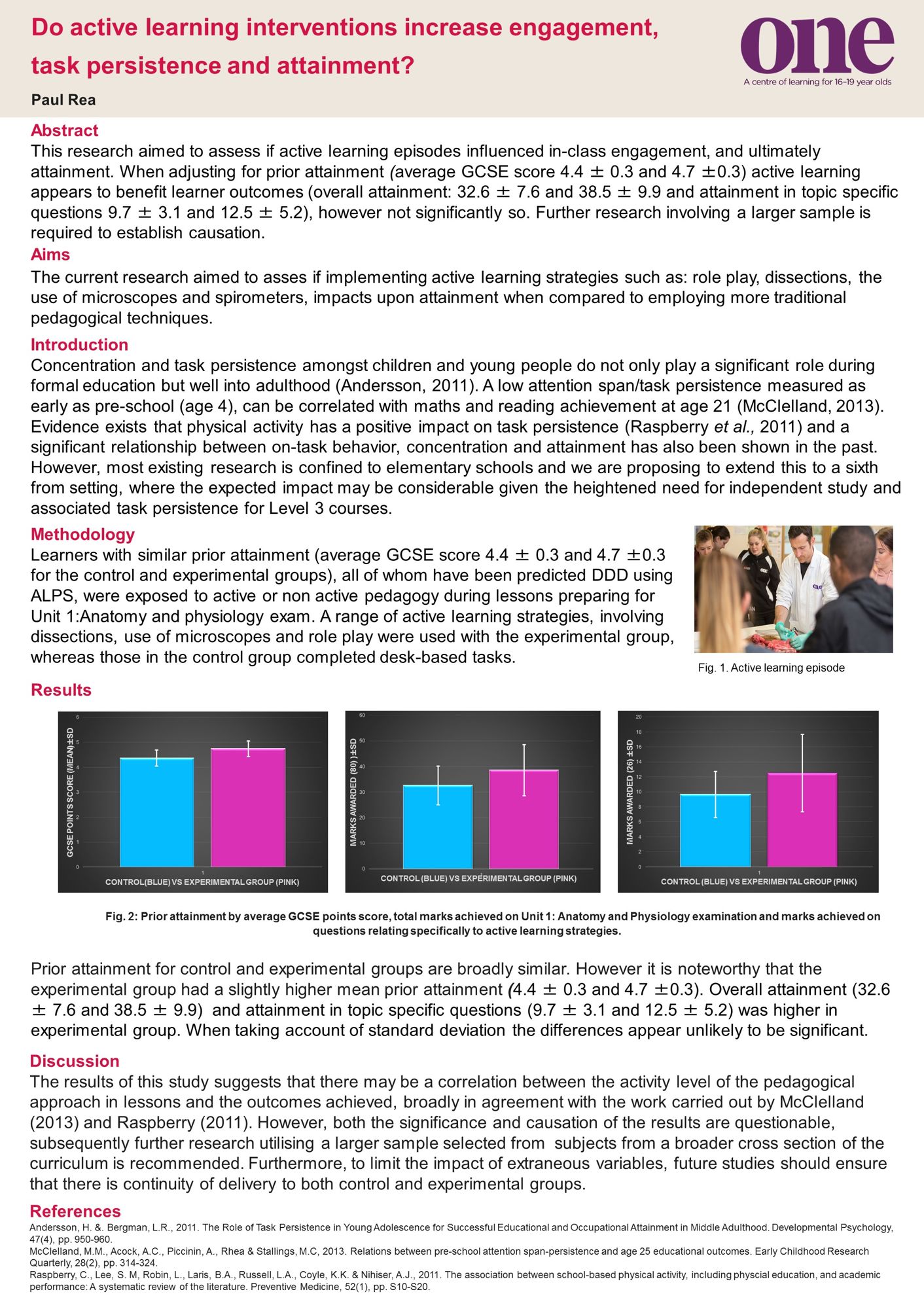Can Active Learning Episodes Improve Task Persistence?
The capacity of students to concentrate and persevere with tasks has been recognised as a factor that can significantly impact on their attainment in formal education and their subsequent success in adulthood (Andersson & Bergman, 2011). Evidence exists that intermittent physically active episodes in class have a positive impact on concentration and task persistence in lessons (Bartholemew et al. 2018), but there is also a need for further research especially in a sixth form setting (https://educationendowmentfoundation.org.uk/ projects-and-evaluation/projects/physically-active-lessons/).
Our research will investigate this link by exposing students to tasks that reinforce knowledge either via traditional static learning or via active phases in lessons. We will then compare attainment, as well as qualitative observations of both students and teachers to assess the impact.
A pilot project will be conducted in BTEC Sport in January and following analysis of the findings this will extended to other subject areas across the college, with the aim of using any significant findings to refine pedagogical practice.
Andersson, H. &. Bergman, L.R., 2011. The Role of Task Persistence in Young Adolescence for Successful Educational and Occupational Attainment in Middle Adulthood. Developmental Psychology, 47(4), pp. 950-960.
Barholomew J.B., Golaszewski N.M., Jowers E., Korinek E., Roberts G., Fall A. & Vaughn S. (2018). Active learning improves on-task behavior in 4th grade children. Preventative Medicine, 111, 49-54
Paul Rea (Research Champion, paul.rea@suffolkone.ac.uk)
Project update - February 2019
Both control and experimental groups have completed a 5 question survey, used to garner their perceptions of the variety of learning techniques they have encountered and which of these they have found useful for developing their understanding to prepare for the externally assessed units they have completed. This should provide an initial insight into any trends and patterns that are evident amongst the learners views. The intention is to then follow this up with further scrutiny by conducting focus groups and semi-structured interviews to explore the views of a sample of the respondents in greater depth. A second phase to the research will begin after half-term, where the two groups will be exposed to different teaching strategies, the control group will be taught the key rules and regulations of a sport in a passive (desk-based manner), whilst the experimental group will learn this content whilst active, both groups will then sit a standardised classroom based assessment and outcomes will be analysed, drawing comparisons, and looking for any significant difference between the development of knowledge and understanding between the groups.
Paul Rea
Project update - May 2019
Since the completion of data collection in March 2019, analysis of the results appear promising. The sample selected was based upon prior attainment, those predicted to achieve DDD grade using ALPS, were selected for scrutiny in both the experimental and control groups Whilst caution should be exercised when assuming causation, it does appear from the limited sample taken and the descriptive statistical analysis undertaken that learners who were led through more active learning strategies, rather than a traditional pedagogical style of delivery have achieved higher outcomes. However, it should be noted that although all students selected in the sample are predicted to achieve DDD using the APLS formula, the experimental group did have a slightly higher average GCSE score (4.4 ± 0.3 and 4.7 ± 0.3 for control and experimental groups respectively).
When analysing overall outcomes, the January Unit 1: Anatomy and Physiology exam was used to compare control and experimental groups performance. Out of a maximum mark of 80, the mean experimental group achieved 38.5 ± 9.9, in comparison to the control group 32.6 ± 7.6. When analysing total marks achieved on specific questions which related most closely to the topics delivered using active teaching and learning techniques to the experimental group, the aforementioned trend in outcomes was broadly repeated. Out of a total of 26 marks that could be awarded when answering questions assessing topics most closely linked to the active learning strategies, the sample in the experimental group achieved a mean outcome of 12.5 ± 5.2 marks, in comparison the control group were awarded 9.7 ± 3.1 marks. The sample size and scope of the current research is too narrow to draw generalised conclusions, or conduct inferential statistical analysis. Furthermore, the mean outcomes for each group are unlikely to be significantly different, when taking the standard deviation into account in each case. However, from the pilot study conducted, further research across a broader range of curricular areas, especially those requiring the acquisition and application of a large volume of technical terminology and knowledge of processes, is highly recommended.
Research Poster







